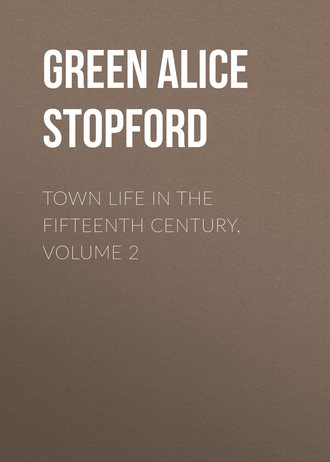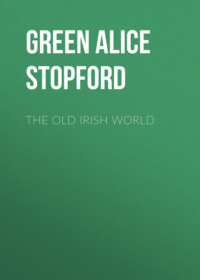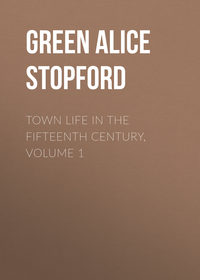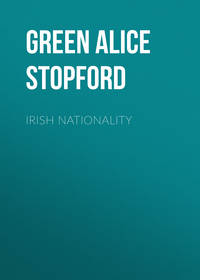 полная версия
полная версияTown Life in the Fifteenth Century, Volume 2
261
Mem. Lond. 543-4. The suppression of the May-day festival of the journeymen shearmen in Shrewsbury was very possibly a similar putting down of confederations and conspiracies. (Hibbert’s Inf. and Dev. of Eng. Gilds, 120-2.) See also the Bristol Coruesers, p. 119, n. 1.
262
Riley’s Mem. Lond. 609-12, 653. Clode, 4, 22-29.
263
The town records of Shrewsbury note in 1516 a reward to the king’s messenger bearing letters concerning the insurrection of the apprentices of the City of London. (Owen’s Shrewsbury, i. 284.)
264
See p. 102, note 2.
265
See Note A, p. 160.
266
English Guilds, cxxi. For an exception at Hull see Lambert’s Guild Life, 188. For Canterbury see H.M.C. ix. 173-4.
267
“The people must cheerfully maintain the government, within whose functions however it does not lie to support the people.” Cleveland’s Presidential Address. Mar. 6, 1893.
268
Stat. 11 Henry VI. cap. 12.
269
Nott. Rec. i. 268-272, 316-318. See also Hist. MSS. Com. vi. 582.
270
Piers Ploughman. Pass. iv. 80-118. There is an instance of a guild in which no parson, baker, or wife, was admitted. (Eng. Gilds, 271).
271
Piers Ploughman. Pass. iii. 222.
272
Riley’s Mem. 182. A summary of the conflict on the price of wine is given in Schanz, i. 642-50. By 5 Richard II. Stat. i. cap. 4 if a vintner refused to sell at the right price the mayor might deliver the wine to any buyer at statute cost.
273
Kingdon’s Grocers’ Company, i., xvii., xviii.; Schanz, i. 651.
274
Norwich Town Close Evidences (Brit. Museum.), 16.
275
Riley’s Memorials, 174-5. Many other examples might be given. A later instance occurs when the London Corporation brought a complaint against the society of hoastmen in 1603 about the raising of the price of coals in London and the scanty supply, so that “without great difficulty the city cannot be provided sufficiently of sea-coals for the poor.” The fraternity of hoastmen make a statement of their reasons concerning the prices of sea-coals to the Privy Council in answer to the complaint of the Mayor and Aldermen. (Newcastle Guilds, 44.)
276
The chief objection of the public to the “unreasonable ordinances” by which the crafts closed their corporations was the “common damage to the people,” probably as tending to raise prices. (P. 102, n. 2.) The Coventry Leet opposed the crafts in this matter.
277
These grants were all of early date, in the twelfth century. Ashley, Woollen Industry, 15-17; Madox, 26, 191, etc., 212, etc., 283-4. The Nottingham weavers paid a rent of 40s. for their guild to the King from the time of Henry the Second. For this they raised a contribution from each loom, and obtained a grant that those who paid might work in the outskirts of the town. (Nott. Rec. iii. 27, 58, ii. 36.)
278
Riley’s Lib. Cus. 130 etc.
279
Ibid. 121, 123. The survival of the weavers’ court may be seen in 1321. In certain cases where the bureller was fined by the Mayor, the weaver was punished by the bailiffs of his own guild. (Ibid. 422-3.)
280
Riley’s Lib. Cus. 423.
281
In 1327 Edward the Third granted a charter to the girdlers of London, which took in all the girdlers of the kingdom, ordered them under the same rules, and set them under the Mayors of whatever city they might be in. (Riley’s Mem. 154-5).
282
Some charters were given by Edward the Fourth and later Kings to companies of Tailors, Merchants, and so on, which gave them an existence independent of the town, and power to make their own ordinances. (See p. 173.) No list has been made out of these companies, and the subject needs investigation. From the cases which I have met with I think it may probably turn out that such charters were generally given to companies with a foreign trade, and given for reasons referring to that trade. The second charter of the Merchant Tailors in 1390 allowed them to make ordinances among themselves and of their own authority. (Clode, 3.) This charter seems to have freed them from the Mayor, but if so they were again put under his control in 1436. (Ibid. 5, see pp. 189-191, 193.) This was followed by a violent attempt in 1442 to have a Mayor of their own company, which failed and caused much anger. It is evident from the charter of Henry the Seventh, in 1502, which confirmed their independence, that they dealt in “all and every kinds of merchandises” “in all quarters and kingdoms of the world.” (Ibid. 7, 195.) By this they were again given full power to make ordinances for themselves without interference, so long as these were not contrary to the laws of the kingdom nor to the prejudice of the Mayor; and the Mayor was wholly deprived of the power of search among their subjects – a most important measure, since the master and wardens “had a great number of householders with their servants to rule and govern.” (Ibid. 197-200.)
283
Though guilds were forbidden in Norwich they existed, doubtless by the payment of annual fines. In the case of the tanners the complaint in 1287 against them was clearly that in case of disputes they “made plaint” to their own aldermen and not to the bailiffs. (Hudson’s Leet Jurisdiction in Norwich (Selden Soc.) p. 13.) The cobblers had apparently an important guild from the money paid; the saddlers, tanners, and fullers had also guilds in 1292. (Ibid. 39, 42, 43.) The King reserved the power of creating guilds, and it was possibly to prevent his exercising it that towns like Norwich and Coventry obtained by charter the right to have no guilds. Such a privilege freed them from the fear of fraternities independent of the municipality, while it left them free to recognise informally associations whose recurring fines were really the tribute paid for existence.
284
Some of those so-called religious, but really trading guilds, have been identified. It is clear that the guild of S. Benedict at Lincoln was a society of traders or merchants, who traded on loans from the common fund, paying back half of the increase they made on it. (English Guilds, 174.) Among other instances see the Guild of S. John Baptist at Hull (Lambert’s Guild Life, 112, etc. 118, 232, 233); Corpus Christi (ibid. 124); Holy Trinity (ibid. 126.) A very curious and interesting account of the formal founding of the Pepperers’ Company as the Fraternity of S. Anthony in the Monastery of Bury, 1345, is given in Kingdon’s Grocers’ Company, i., xvii. Compare the records given on 8-15. It had become the Grocers’ Company by 1373. The Drapers’ Guild in Shrewsbury was originally the Guild of the Trinity. (Hibbert’s Inf. and Dev. of Eng. Guilds, 32.) For other instances see Chapter V. The custom was so common in the fourteenth and fifteenth centuries that it is highly probable that under any stress of difficulty it would have been resorted to in earlier days. The artizans must have been fully aware of the fact disclosed to us by the two forms of summonses for guild returns issued in 1388, one for the religious and one for the trading guilds – the fact that the two forms of association were regarded in a different way by the government. Some guilds are avowedly of a double character. (English Guilds, 126-128, 179-185.)
285
See note A at end of chapter.
286
Riley’s Mem. 627; see also 118, 120-1, 153-4.
287
Riley’s Mem. 341.
288
In the second half of the fourteenth century the London guild ordinances are in the main simply rules against bad or deceitful wares. See the chandlers, curriers and pelterers, cappers, potters, &c. Riley’s Mem. 118, 358; Lib. Cus. 94, 101; goldsmiths, Schanz, i. 613-4.
289
Mem. Lond. 293.
290
Lib. Cus. 100.
291
Mem. Lond. 280-2.
292
Riley’s Liber Custumarum, 101. See the case of the weavers infra p. 160, where the craft tried to shorten hours and the town forbade it.
293
Ordinances of Pewterers. Riley’s Mem. 243. See also glovers and hatters, &c., 239, 246.
294
Ibid. 226.
295
Riley’s Mem. 226-7.
296
Ibid. 218.
297
Annual congregations made by the masons were forbidden by statute of Richard II., continued by later Kings (3 Henry VI., cap. i.). The anxiety of the government was quickened by the number of tilers who took part in the Peasants’ Revolt. (Stubbs, ii. 496.) Cf. The Common Weal (ed. Miss Lamond), 88-9.
298
Statutes of the Realm, 3 Edward IV. cap. 4; ibid. 4 Edward IV. cap. 1. A law of 1410 withdrew from the worsted-weavers and merchants of Norwich the supervision of the cloth trade that had been granted to them in 1348 (Ashley, Woollen Industry, 54-5); and handed over to the mayor, sheriffs, and commonalty of Norwich, the right of measuring and sealing all worsteds made in Norwich or Norfolk. (Blomefield, iii. 125.) A later law enacted that “the worsted shearers in Norwich shall make no ordinance but such as the Mayor and Alderman shall think necessary.” (Stat. 1494, cap. xi.) In the fifteenth century the Privy Council took away from the Bakers’ and Tailors’ Crafts in London the right of search in their trades which had been granted to their Wardens, and restored it to the Mayor, and ordered the crafts to obey the Mayor after the old usages, customs, and laws of London. 1442. Proceedings Privy Council, v. 196; Seligman, Med. Guilds, 82; Schanz, i. 617.
299
The mayor and aldermen of London had full jurisdiction over all the various trades quite early in the fourteenth century. Two master-masons were reconciled before the mayor of London in 1298. (Mem. Lond. 38.) For early part of the fourteenth century see ibid. 90, 118, 120, 153-4, 216, 156, 178, 245-6.
300
In “the ordinances of the Hull Guilds from 1490 to 1723 there is no authorization by any but the mayor of the town.” (Lambert’s Guild Life, 188.) For municipal authority over the Shrewsbury Guilds see Hibbert, 40, 85-6. For Norwich, Blomefield, iii. 130.
301
A law of 1413 ordered the registration of charters and approval of ordinances and bye-laws – a law which was repeated by the Statute of Henry VI. to prevent the masters of guilds and fraternities making ordinances to the damage of the King or the people, when it was again decreed that all their rules should be certified and registered by Justices of the Peace or by the chief magistrates of cities or towns. 15 Henry VI., cap. 6. See also 19 Henry VII., cap. 7.
302
English Guilds, 283-286.
303
Ricart, 78. The examples are too numerous to give. But see the ordinances drawn up in 1448 for the Tailors’ Guild of Lynn by the Mayor and the Council. It was ordered that no new tailor should set up in business unless he was considered “sufficient in conning” not only by the two head men of his craft, but also by the mayor. Every tailor admitted to the guild had to pay a fine as entrance fee to the Mayor and another to the community, as well as his payment to the Guild; and paid a yearly fee to the town for any sewers and apprentices whom he employed. Quarrels between shapers and sewers were to be settled by the Mayor and the head men of the craft. If a tailor sent home an ill-fitting garment the buyer might bring his complaint to the Mayor’s Court, and claim amends before the Mayor and the head men of the craft on condition of paying a fine of 3s. 4d. if he did not prove his case. (Hist. MSS. Com. xi. 3, 165-6.)
304
Miss Dormer Harris has kindly given me the rules at Coventry as to how a craft was to proceed to the punishment of a member in 1518. The master of the craft was first to ask a “reasonable penalty;” if the offender refused to pay, the master was to apply again after three or four days and have the refusal recorded; and in case the refusal was repeated a second time he and three or four of the “honest men” of the craft were to come to the mayor; and the mayor and one of the justices were to command the offender to pay a double penalty; and if he refused yet again, to commit him to prison until it was paid to the craft. At the same time the offender was to desire the master to be “good master to him and his good lover.” If the penalty were more than would suffice for a pound of wax, the remainder was to go to common box, i. e., the city funds.
305
The tilers were strictly ruled by statute as to how the various tiles should be made, thatch tile, roof tile, gutter tile, and so on; how the earth should be prepared and how big the tiles should be. Justices of the Peace, that is in towns the Mayor and the Aldermen, were to hear the cases against offenders and appoint searchers. (17 Edward IV. cap. 4.)
306
Mem. Lond. 308.
307
English Guilds, 386, 398-9.
308
Hist. MSS. Com. ix. 174.
309
Nott. Rec. i. 197. In Winchester every bureller had to give one cloth yearly to the King’s ferm. (English Guilds, 351.)
310
Enforced contribution of crafts was common; and the cost considerable. (Gross, ii. 51; Hist. MSS. Com. xi. 3, p. 166, 225; ibid. ix. 173-5.) See Kingdon, ii. 260, 318, &c. In Coventry there were complaints in 1494 that the dyers, skinners, fishmongers, &c., were so “self-willed” that they could not be made to contribute to pageants. See Hibbert’s Inf. and Dev. of Eng. Gilds, 63. For the whole question of plays and pageants see Davidson’s Studies in Eng. Mystery Plays, printed by Yale University, 1892. The Corpus Christi processions became after the order of the Council of Vienne, 1318, exceedingly popular; the guilds of Corpus Christi, having charge of the procession, not of the plays (91-2), were probably generally composed of the upper class of people. A list of Miracle Plays and Mysteries has been made for students by F. Stoddard, California University, 1887.
311
Von Ochenkowski thinks the relation of municipalities and crafts depended on the relative force of the three principles then contending for the mastery – feudal rights, the king’s will, and the common law; in the conflicts between guilds and towns he sees the alternating forces of the king’s law and of the common law. (Wirthschaftliche Entwickelung, 59-60.) Many homelier causes than this were probably at work.
312
The surprising number of guilds formed under Richard the Second and during the next hundred years must strike any one who looks at the town records. As a single example see the list given for Shrewsbury in Hibbert’s Inf. and Dev. of Eng. Gilds, 58-9. In many cases it can be proved that the new fraternity was really an old one, but its re-constitution is as important as a new creation.
313
Boys’ Sandwich, 678, 680.
314
Hist. MSS. Com. ix. 173-4. “Provided always that any such masters so elected shall be none of the same crafts or mysteries whereof they shall be elected.”
315
Boys, 685, &c.
316
Hist. MSS. Com. ix. 173-5, 148. Sometimes wealthy guilds united to gain a monopoly of power in the borough. There was a tendency to combine even in the poorer social or religious fraternities. (Eng. Gilds, 219.) A decline took place in the number of miracle plays for the crafts. Pollard’s Miracle Plays, xxx.
317
See the curious provision made by the mayor of London at the request of the farriers to get their bills paid. (Riley’s Mem. Lond. 294.)
318
English Guilds, 285.
319
Hist. MSS. Com. ix. 174.
320
Shillingford’s Letters (Camden Soc.) 4.
321
Though this body of Twelve appears first in the records in 1344, it is impossible to doubt that it was of earlier origin, in view of the custom of other boroughs. In the same way the notices in 1288, 1301, and later, of the electing jury do not by any means imply that these were its first appearances, and all analogy would point to an opposite conclusion.
322
Freeman’s Exeter, 147, 149.
323
Mr. Freeman seems to suggest that the Council of Exeter was formed by the habitual summoning of certain members of the Assembly to advise the mayor, and speaks of it as “a committee of the whole body.” (Ibid. p. 152.) It is, however, not yet certainly ascertained whether the evidence bears out this view as regards Exeter.
324
The regular list of recorders or law officers begins in 1354. Freeman’s Exeter, 154.
325
Freeman’s Exeter, 146-7. English Guilds, 303, 307, 308.
326
Both these classes admitted “out-brothers,” probably “foreigners,” who paid half fees.
327
English Guilds, 313-316.
328
Ibid. 318, 324, 327.
329
Ibid. 321-2.
330
His first charter to the Tailors was in 1461 (Gross i. 124 n. 2); the second in 1466. A different instance occurs in Shrewsbury, when Edward the Fourth gave in 1461 a charter to the Fraternity of the Blessed Trinity making it into the company of the Drapers. (Hibbert’s Influence and Development of English Guilds, 59.)
331
English Guilds, 301, 307, 310. Gross i. 124.
332
English Guilds, 309-311.
333
English Guilds, 302-304.
334
Ibid. 303.
335
English Guilds, 304-8.
336
English Guilds, 324.
337
Ibid. 326.
338
English Guilds, 323.
339
Ibid. 331-4.
340
Ibid. 334-7.
341
This forms the earliest account we possess of the costs of a private bill. Ibid. 308-311.
342
Freeman’s Exeter, 146-154.
343
English Guilds, 328.
344
See Chapter XIII. p. 352-4.
345
In 1376 the judges held that no guild could be established save by royal charter. (Seligman in his Med. Guilds p. 66, quotes Year Book 49, Edward III. fol. 36.) On the other hand in 1376 the commons presented a petition complaining that many of the mayors were prevented from exercising their office thoroughly by the special charters which had been granted to certain misteries and praying that these special charters might be withdrawn so as to strengthen the hands of the local authorities. (Rot. Parl. ii. 331 No. 54.) See Gross i. 113 note 2. For instances of royal charters to guilds see the Mercers of Shrewsbury (Hibbert, 64), the Tailors of London (Clode’s Merchant Tailors), and various companies in Hull (Lambert’s Two Thousand Years of Guild Life).
346
A curious instance is given in Hull in which one of the county magnates made use of the guild as an instrument for getting hold of the borough representation in Parliament. (Lambert’s Two Thousand Years of Guild Life, 182.)
347
The story of the Hull Merchants’ Company is very instructive. Ibid. 180, etc.
348
See Chapter VIII. The union of crafts in a guild at Walsall (Gross ii. 248) before 1440 seems to have been very like the union of crafts at Coventry a century earlier to get control of the town government, “in eschewing of such great misorder and inconvenience as here of late hath fortuned and happened.”
349
Carlisle Mun. Rec. ed. Ferguson and Nansen 89-99.
350
The town customs and bye-laws were drawn up in 1561 by “the Mayor and Council with four of every occupation in the aforesaid city, for and in the name of the whole citizens (Carlisle Mun. Rec. 28, 29, 59). In Beverley the alderman of merchants and twenty-one aldermen of various crafts gave assent in the fifteenth century to ordinances of the governors.” (Gross, ii. 23.)
351
Gross, ii. 380-3.
352
See Chapter XIII. 374-5.
353
Gross, i. 111, note 3. The cases of Durham and Morpeth here mentioned are very late.
354
Ibid. 112, note 4.
355
Ibid. i. 124 note 2. Von Ochenkowski (Wirthschaftliche Entwickelung, 67) argues that this regulation was made in consequence of the mediæval view of trade as a public trust not a mere individual act; and that skill in craft was taken as a test of uprightness of character and a pledge of fitness for citizenship. From this conclusion follows the belief, which in its turn supports the conclusion, that the rule was one imposed by the town authorities and not by the will of the crafts.
356
Stubbs, iii. 607.
357
This history has been treated by Dr. Gross in his “Gild Merchant.” In the thirteenth century Merchant Guilds existed in at least one-third and probably in a much greater proportion of the English boroughs. (Gross, i. 2, 22, 158.)
358
Ibid. i. 107.
359
Gross, i. 74, 107, 108, note 3, 109. There were clergy and women in the Andover Guild (Ibid. ii. 299, 321); and in Coventry (English Guilds, 228).
360
Gross, i. 66-71, ii. 236.
361
Ibid. i. 43, 61, 158-9.
362
Ibid. i. 282-3.
363
Gross, i. 61-63, 85. Sometimes the grant of a guild was given before the grant of other rights. In other cases it followed. Thus in Gloucester the first charter was given by Henry the Second “to my burgesses of Gloucester” in 1155. The Guild did not appear in the charter till 1200, when John granted certain municipal rights to “our burgesses of Gloucester,” and others mainly of a trading sort to “our burgesses of Gloucester of the Merchant Guild”; and in 1227 a charter of Henry the Third seems for the first time to enact that burgesses must not only dwell in the borough, hold land, and pay lot and scot, but must also “be in the Merchant Guild and Hanse.”
364
Ibid. i. 43-52, 158-9.
365
Ibid. i. 63, 85, 114. “In some places their powers appear to have been gradually enlarged during the thirteenth century so as to embrace jurisdiction in pleas relating to trade.” (Ibid. 65.)
366
Ibid. i. 114-115.
367
Gross, i. 117, 159-60.
368




